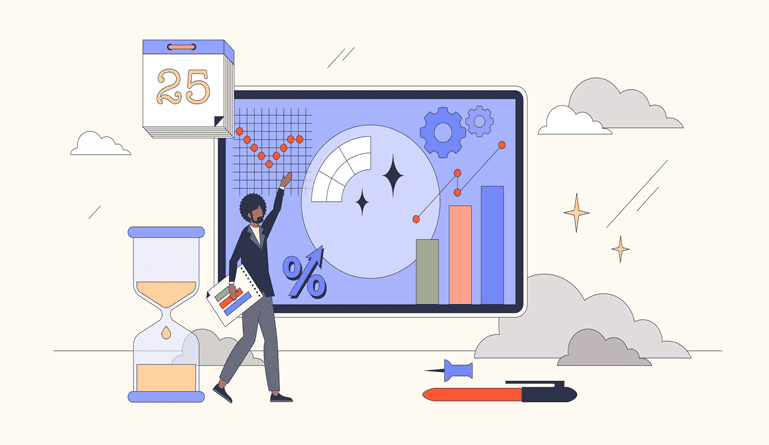You likely know AI marketing strategy is important, but maybe you’re unsure of what it is exactly, where to begin, or if it’s worth the investment. You probably see the phrase everywhere but also worry if it’s just another buzzword, a trend, or something that truly will change how you do business. This feeling is completely understandable because the current media landscape is cluttered with buzzwords and promises of silver bullet solutions.
But with 88% of marketing teams already integrating AI for tasks like creating content and personalized interactions, maybe those marketers are onto something. Before dismissing it all as hype, it’s smart to investigate further, especially since 64% of marketing professionals already use some AI tools in their work, however minimal. AI marketing strategy goes beyond simply “using AI” in a few areas. Instead, it means making thoughtful choices about how AI fits into your overall marketing goals, processes, and even brand identity.
Understanding AI Marketing Strategy
Before building your AI marketing strategy, it helps to know what AI offers in the context of marketing. AI tools use complex algorithms and data to either learn on their own or do tasks much faster than a human team could. This includes identifying potential customers, predicting which messages will resonate with them, and personalizing their experience across every interaction with your brand.
This isn’t just theoretical, either. Research from McKinsey confirms what most of us intuitively feel: 71% of consumers expect companies to provide personalized interactions. If a brand falls short, they risk losing those customers to savvier competitors.
Imagine a consumer who has consistently expressed an interest in fitness-related products but still receives irrelevant emails promoting cosmetics. Chances are that customer will go elsewhere. 71% personalization is unrealistic without AI marketing automation because a human team can’t scale that precisely to hundreds, thousands, or even millions of customers. AI can tailor email campaigns with dynamic content and even target language preferences automatically.
 Key Components of an AI Marketing Strategy
Key Components of an AI Marketing Strategy
So, where to begin? A robust AI marketing strategy requires these key components:
-
Defining goals
Determine which goals AI will realistically help you reach. Are you trying to increase brand awareness, generate leads, convert more leads into paying customers, improve customer engagement, streamline operations, or lower costs? Knowing the “why” will drive choices about “what” AI tools to implement.
-
Identifying use cases
Don’t use AI for everything because that’s impractical. Instead, consider where in your existing marketing workflows AI is likely to provide the most benefit. For example, is creating high-quality blog posts time-consuming? Are there tasks that feel tedious but also crucial for gathering insights or contacting customers, making them suitable for automation?
-
Data evaluation and infrastructure
Because AI runs on data, your system has to be organized, accurate, and secure to avoid faulty outcomes and even privacy issues. A poor data strategy creates inaccurate outputs. Dedicate resources to both technology and data cleaning processes to prevent these mistakes.
-
Ethical considerations and risk mitigation
AI offers great opportunities but also presents potential ethical concerns that could even damage your brand reputation. Address these early on, especially regarding data privacy and compliance with evolving regulations. Build processes to prevent AI systems from perpetuating biases, spreading misinformation, or invading customer privacy.
-
Team integration and skill development
It’s great to have the most advanced technology, but remember the “human element” of using it strategically. Invest in your marketing team’s skill development so they feel confident about incorporating AI into their day-to-day activities, making insightful choices, and navigating challenges.
(Also Read: AI Tools for Content Marketing)
AI-Powered Marketing Strategies in Action
You may be wondering how AI marketing works beyond lofty descriptions. Here are some common and powerful applications:
-
Content Creation
Forget clunky content spinners from the early 2000s. AI-powered SEO blog writing is leagues ahead and allows you to scale content marketing at speeds unimaginable to even the most gifted writer. Take Content at Scale, for instance. This tool generates SEO blog posts in minutes, freeing up time to fine-tune for your unique voice and brand requirements.
Visual content is crucial for grabbing reader attention and also benefits from AI with apps like Lexica Art. This tool creates visually engaging thumbnails, the perfect solution to avoid settling for generic stock photos. To polish your final content, tools like Hemingway App offer instant analysis, helping to tighten prose and achieve better readability.
This benefits readers who need information quickly and Google, which looks at engagement as a quality indicator. Working with freelance writers or a larger team? Writer provides a platform for collaborative writing while using AI to check for brand consistency and accuracy.
If concerned about distinguishing between AI and human-written content, services like Undetectable AI can help in “rewriting” or analyzing text.
-
Personalized Customer Engagement
One-size-fits-all messaging simply doesn’t cut it anymore, especially as consumers crave experiences tailored to them. Platforms like Algolia use advanced search and recommendation algorithms. This is how sites like Netflix and Spotify predict user interests. While we can’t all build that tech ourselves, adopting tools that offer similar insights is crucial for any AI marketing strategy.
Think how these apps could impact your eCommerce store by automatically suggesting complementary products based on what the shopper has in their basket. The possibilities for upselling are immense.
If personalization through analysis is one aspect, another is direct customer communication. Building AI-powered chatbots using tools like Chatfuel lets your brand offer personalized assistance to thousands of users simultaneously. Chatbots answer common questions and even guide users down the purchase funnel.
With email still being the workhorse for driving conversions and promising leads, tools like Reply.io’s AI Sales Email Assistant automate a previously labor-intensive process, creating compelling content and even offering dynamic subject lines that are personalized to the reader. These tools try to predict and prevent unopened emails.
-
Analyzing Data and Campaigns
In marketing, data analysis is everything. But too much data, especially across disparate sources, is a headache. Here’s an interesting stat: according to a 2024 marketing survey, 53% of marketers already rely on AI for analyzing data.
One notable tool that integrates various business workflows is Zapier, offering task automation capabilities. Zapier connects platforms that usually live in isolation, allowing them to “talk to each other”. Fullstory focuses on user experience, diving deep into user interaction data with its AI system, turning complex behavior into “stories” that marketers can understand. This helps brands quickly fix site errors, anticipate needs, and offer seamless transitions from discovery to conversion.
Then there’s the often tricky world of advertising. Platforms like Albert.ai go beyond basic targeting, using AI for marketing campaign optimization. These platforms optimize ad placement and budget recommendations in real-time for maximum impact. Pattern89 uses its AI prowess to do the same for paid advertising campaigns. This frees up your marketing team to focus on developing brand strategy and messaging, the more creative elements AI isn’t yet great at, despite the media hype about these capabilities.
Final Thoughts
This shift toward consumer-centric experiences doesn’t feel revolutionary in principle because, for decades, savvy marketers have known the power of understanding and appealing to individual needs. What is unique about AI marketing strategy is how it scales that “human approach” using powerful tools for data collection, automation, and prediction. These are tasks even the largest marketing departments can’t do consistently and efficiently without the support of AI.
While tech companies with big promises hype certain AI features, the real focus should be those tangible results. Whether AI helps us do repetitive tasks quickly so we have time for more creativity, or it creates personalized user journeys for thousands of shoppers at the click of a button, these innovations shouldn’t make us feel anxious that AI is taking over.
AI marketing strategy offers new possibilities and new tools to accomplish goals that remain constant, which is appealing to customers, making them feel heard, valued, and even delighted by our brands.
FAQs about AI marketing strategy
Q. What are some real-life examples of an AI marketing strategy being successful?
A. Netflix and Spotify use AI-driven personalization of content suggestions, resulting in higher viewer engagement and reduced churn rate. Amazon utilizes AI-powered product recommendations to enhance user experience and encourage cross-selling. Starbucks’ reward app integrates AI-driven personalization, sending targeted offers and promotions that consider past purchase history. These brands, each in a different industry, demonstrate that a well-crafted AI marketing strategy yields real, measurable business outcomes.
Q. What is the best approach to ensure ethical practices within an AI marketing strategy?
A. The most vital aspect of an ethical approach to any AI marketing strategy is transparency with both your customers and team members. Explain how and why AI is used to process data and create targeted recommendations. Then, give consumers clear options for either controlling or even opting out of those systems.
If they don’t feel pressured, trust builds, even if a potential customer declines a recommendation based on AI. The worst move is to build systems customers find intrusive. That perception backfires quickly in an era of heightened data privacy awareness.
Q. What should I look for when choosing AI tools?
A. This choice is like choosing a marketing automation agency. Each AI tool has its unique strengths. Factors to consider include how well the platform integrates with your current systems and processes. Other things to think through include scalability based on your needs, security features related to your privacy policy, user interface and ease-of-use (a great system people find too complex to learn isn’t an effective tool.), and ongoing technical support that’s both timely and high quality. There’s nothing more frustrating than experiencing an issue during a crucial campaign with no recourse, so remember your choice needs to benefit the human element of your team.








